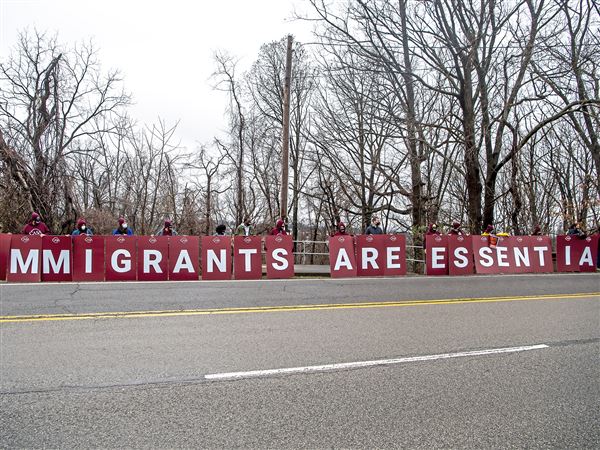The chances that Pennsylvania's 2008 primary will be moved to an earlier date are slim, but a key aide to Gov. Ed Rendell kept trying today.
Appearing before the Senate State Government Committee, Pedro Cortes, secretary of the Department of State, repeated his boss' desire to hold the 2008 primary in February rather than April 22, as now scheduled.
Mr. Rendell prefers Feb. 5, but the state House recently approved a measure, sponsored by Rep. Harry Readshaw, D-Carrick, to move it to Feb. 12.
But such a move looks doubtful because the state Senate recessed for the summer last week without acting on Mr. Readshaw's bill, and as of now it seems doubtful the Senate will take it up when it returns Sept. 17.
"Gov. Rendell favors a primary date that ensures Pennsylvanians have a voice in selecting presidential candidates," Mr. Cortes said. "Many states are moving their 2008 elections and caucuses earlier in the year."
Many states will hold their primary elections well in advance of April 22, he said, which likely will mean that both the Democratic and Republican presidential candidates will already by chosen by the time Pennsylvania holds its primary. Pennsylvania voters will thus have no impact on the outcomes. Eighteen states will hold primaries on Feb. 5, creating a "Super Duper Tuesday."
Mr. Cortes released a schedule of things that would have to happen sooner if there were a Feb. 12 primary. For example, the first day for candidates for federal and state offices to circulate their nominating petitions would be Nov. 13. With the current April 22 primary, that date is Jan. 22.
The last day to file the nominating petitions would be Dec. 4, if the primary is Feb. 12. With an April 22 primary, the last day to file petitions is Feb. 12.
The last day to send absentee ballots to military and overseas voters would be Dec. 24 if the primary is Feb. 12. With an April 22 primary, that last day is March 3. The last day to register to vote in a Feb. 12 primary would be Jan. 14. With an April 22 primary, the deadline to register is March 24.
Some county election officials have opposed an earlier 2008 primary, saying their work would be greatly complicated if they have to conduct this year's November elections at the same time they are handling paperwork for a February primary.
Target on teen smoking
Lawmakers haven't been able to agree on the details of a proposed statewide smoking ban, but some elected officials are chipping away at the issue through smaller-scope bills.
The latest, filed by state Reps. James Wansacz and Frank Shimkus, both Lackawanna County Democrats, would crack down on minors who use or possess tobacco products.
Existing law prohibits minors from buying tobacco, but not from using or possessing it.
Under the Wansacz-Shimkus bill, minors caught carrying or using tobacco would be given a written warning for the first offense, sentenced to a maximum of 75 hours community service for a second offense and required to attend a smoking cessation program for a third offense. Fines of up to $100 could be imposed for subsequent offenses.
The bill has been referred to the Children and Youth Committee.
Summer road act
A state Senate committee hit the road this summer in a search of a new solution for Pennsylvania's financially distressed municipalities.
Sarina Rosenberg, an intern for the Pennsylvania Legislative Correspondents' Association in Harrisburg assigned to the Pittsburgh Post-Gazette, followed the lawmakers to Philadelphia for a hearing there this morning.
Twenty years after lawmakers launched Act 47 to help financially troubled municipalities such as Pittsburgh pay for crucial services, only five have improved their financial situations enough to be removed from the list.
That's why this year, Senate Urban Affairs and Housing Committee chairman John Pippy, R-Moon, said, he's ready to "try something different." The committee is holding hearings in financially distressed areas across Pennsylvania -- a stop in Pittsburgh this fall is in the works -- to ask local leaders how the state can help ease their financial woes.
After the tour, the committee will team up with Senate committees on finance and economic development to create a comprehensive approach to lifting more of the municipalities off the Act 47 list, said urban affairs co -chairwoman Sen. Shirley Kitchen, D-Philadelphia.
"I think this is a good way to start out developing our agenda for the next couple of years," Ms. Kitchen said. "We should have been looking at this before."
City-government officials were at Philadelphia's City Hall today to discuss their experiences managing the city's ailing pension, welfare and healthcare assistance programs. The hearing, and others like it planned for the rest of the summer and fall, will help lawmakers craft more effective statewide policy, Sen. Pippy said.
"I think all cities are dealing with similar problems, like pension-term debt and healthcare, and a dwindling population with increasing costs," he said. "If we're going to discuss these new ideas, I think we really need to know what the effect will be."
Reviewing the reviewers
Sen. Arlen Specter wants to take a closer look at promises made by U.S. Supreme Court Justice John Roberts and Justice Samuel J. Alito before they were confirmed for the high court, the Politico reports today.
As nominees, both said they would be reluctant to overturn established legal precedent. Yet the early days of the Roberts court have seen some sweeping decisions, including one terminating desegregation programs at public schools in Seattle and Louisville.
Mr. Specter was the chairman of the Senate Judiciary Committee at the time of the nominations.
"Specter, who championed their confirmation, said Tuesday he will personally re-examine the testimony to see if their actions in court match what they told the Senate," the Politico article says. "The Specter inquiry poses a potential political problem for the GOP and future nominees because Democrats are increasingly complaining that the Supreme Court moved quicker and more dramatically than advertised to overturn or chip away at prior decisions."
Mr. Specter, however, didn't say he had been misled, as some Democrats are arguing.
Agritourism? See Webster's
The state Department of Agriculture has issued its fourth version of what it calls the "Blue Ribbon Passport."
The brochure is designed to identify agriculture highlights along Interstate 79 in western Pennsylvania and Interstate 78 in the eastern part of the state. It directs visitors to 199 fairs, farm markets, wineries and other events and locations available from summer through fall.
It was launched to take advantage of the growing trend toward "agritourism," trips taken to agricultural centers. Agritourism sounds like a mouthful, but it has gained enough popularity that the ward officially was added to Merriam-Webster's Collegiate Dictionary last year.
The Blue Ribbon Passport is available at all Pennsylvania Welcome Centers or at the visitPA Web site.
First Published: July 25, 2007, 8:00 p.m.














